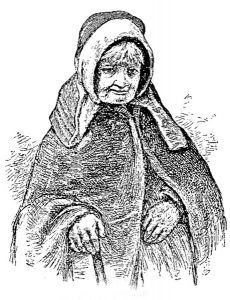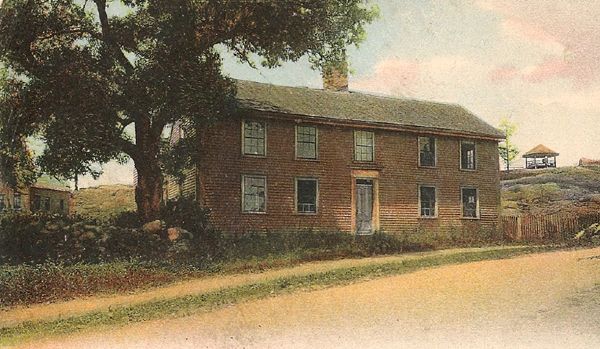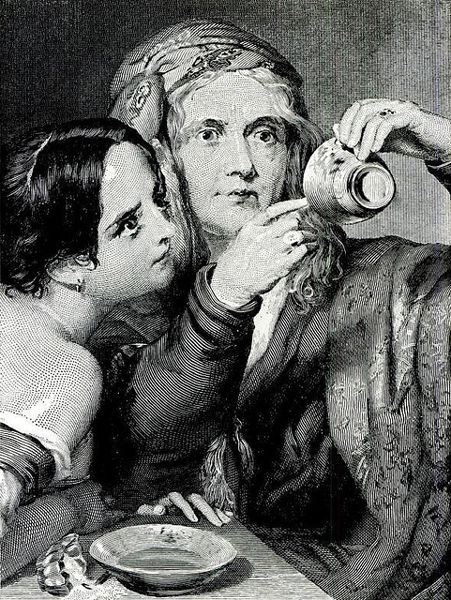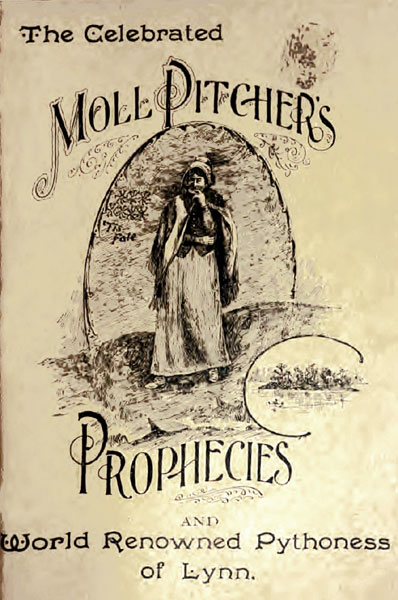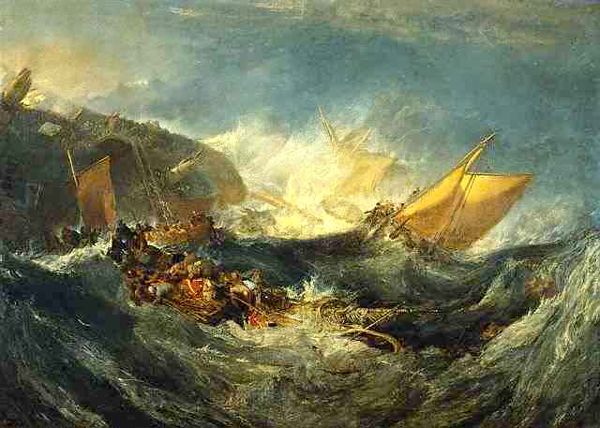She stood upon a bare tall craig
Which overlooked her rugged cot –
A wasted, gray, and meagre hag,
In featured evil as her lot.
She had the crooked nose of a witch,
And a crooked back and chin;
And in her gait she had a hitch,
And in her hand she carried a switch,
To aid her work of sin.
— John Greenleaf Whittier
Moll Pitcher, said to have descended from a long line of “wizards,” was a clairvoyant and fortune-teller from Lynn, Massachusetts. She was born Mary Diamond in about 1736 to Aholiab Diamond and Lydia Silsbee Diamond in Marblehead, Massachusetts. Her father was a shoemaker in Lynn, Massachusetts. Though there were no public schools for girls when she was young, she seems to have received some education. She grew up to marry Robert Pitcher on October 2, 1760, who was thought to have been an apprentice of her father.
The couple lived with her parents and would have four children. Shortly after her marriage, she became known as a fortune-teller of significant skills. To many, this came as no surprise, as her grandfather, Captain Aholiab Diamond, had long been known as “The Wizard of Marblehead,” who had a reputation for using his powers to save sailors from shipwrecks during storms, as well as locating thieves and lost objects. Moll would grow to share his reputation, with numerous stories circulating about her prowess, even including that she had passed British military secrets to George Washington and that she prophesied he would become President.
By reading tea leaves for her clients, her reputation increased over the some 50 years that she “operated,” astounding people with her successful predictions. She was consulted by all classes, including the educated and the uneducated alike, some of whom were known to be visiting noblemen from Europe. Her predictions concerned love affairs, legacies, crime, and, of course, seeing into the future. But, her most important predictions involved the outcome of voyages. Crews were said to refuse to sail on voyages she predicted would be disastrous, and ship owners would refuse to risk their ships. Treasure-seekers also consulted her, but she was said to have little patience with them, sometimes responding, “Fools, if I knew where money was buried, do you think I would part with the secret?” Many thought that she was a witch. Indeed, had she been born a century before, she probably would have been hanged.
Moll Pitcher died at the age of 74 on April 9, 1813. The home where she was born and lived continues to stand in Marblehead, Massachusetts.
Afterward, she would become the subject of books, plays, and a 900-line poem by John Greenleaf Whittier. The poem is not complimentary, describing her as a witch engaged in sinful work. Initially buried in an unmarked grave in 1887, a tombstone with the following epitaph from John Greenleaf Whittier’s poem was erected in her memory:
Even she, our own weird heroine,
Sole Pythoness of ancient Lynn,
Sleeps calmly where the living laid her;
And the wide realm of sorcery,
Left, by its latest mistress, free,
Hath found no gray and skilled invader.
On July 12, 1879, the Boston Traveler published an article about her. It not only tells more about the woman herself but also debunks her once-revered talents.
“One of the quaintest and most peculiar female characters this country ever produced was Moll Pitcher, the famous fortune teller, who resided at Lynn, but was of Marblehead extraction. But, little has been written about her because nothing of great and interesting importance has been preserved except what can be gleaned from old people in whose memory she still lives. She was very celebrated, and there was not a port in Europe into which American vessels sailed, flying the American flag, that had not heard of the wonderful powers of Moll Pitcher. Indeed, it is said that when such a vessel appeared in some of the smaller ports, interested persons would crowd upon the piers to inquire of the sailors of the “old woman across the sea.” Sometimes, too, people on the continent who could not come across the ocean would send, through their friends, the necessary information to Moll and have their fortunes told. Her habitation on what is now called Essex Street was a curiosity in itself. It was a black two-story hovel, which stood in a large field, familiarly called in those days the Pitcher field. A well-beaten pathway ran from the old rickety gate up to the single door. Before the door was placed, an irregular block of stone, and even that, to the superstitious, had its terrors.
The door stood to the extreme left of the house and opened into a small entryway, which, in turn, opened into a rather large room where Moll received her visitors. Two small rooms were adjoining this large one, which was used for various purposes. The neighborhood in those days was very scantily settled; indeed, it was one of the most lonesome quarters of the city. The boys were afraid after dark to play anywhere near the Pitcher cottage, for Moll was a terror to them. Now Essex Street is one of the city’s most pleasant and most desirable. The field where the cottage stood has been filled with nice dwellings, and there is not a sign left of the mysterious dwelling place of this most remarkable woman of her day except the remodeled hovel which stands in the rear. It has been materially changed and would scarcely be recognized.
The personal appearance of Moll has been greatly exaggerated, and fancy pens and imaginative brains have pictured her as a miserable hag whose grizzled visage never knew a smile and who never had a drop of sympathy for anybody. But this is far from correct. On the contrary, she was a pretty woman in her prime. Mr. Hobart Linton, a resident artist, drew a portrait of her, but by those who have seen her often, it is pronounced to be miserable. He represents her as a worn-out woman dressed in a heavy hood and carrying a crotchety cane. Her face has not the least appearance of intellect but of childishness and weakness. Linton’s Moll Pitcher is a testy travesty of the original. According to the best information that can be gathered, Moll Pitcher was a pretty woman and possessed, in her younger days, a beauty that was attractive. Beauty generally runs through a family, and her descendants are “among the prettiest young ladies of Lynn.”
She was tall and very thin; had piercing black eyes and a long Athenian nose, which indicated great shrewdness. She dressed almost elegantly and was one of the fashionable belles of the day. She was light in complexion and matched her clothes with the best of taste and skill. She generally wore a black bonnet, which was very fashionable in those days and would not now be considered out of style. As she grew old and became emaciated — for she lived to be 75 years of age — she grew very spare. Her nose became peaked, and her features seemed to lengthen out as the cheeks grew hollow. She never lost her vitality until the declining years of her long life, and never carried a cane to support herself. She did not totter or stumble but ambled off like a frisky colt when she was 70 years of age. Her most habitual mode of covering her head, and one perhaps peculiar to herself, was to bind a black silk handkerchief about her forehead. Sometimes she wore a cap, but very seldom.
She had four children; one son, John, and three daughters, Rebecca, Ruth, and Lydia. It was always the aim of Moll to find out as much as she could, from whoever wished to consult her, of the circumstances which led to their desired consultation with herself. She could not do it herself, for that would be too suspicious. Here, her daughter “Becky” was of value. She was to receive the visitors and talk with them. She was to tell them that her mother was away but would be back presently. The truth is, however, that Moll was hidden in one of the adjoining rooms and intently listening to the conversation, which was very material to her. When she had gathered all she cared to know and was ready to enter, she slipped out and entered by the door. Then, with wonderful accuracy, she proceeded to tell all the circumstances and fairly startled her visitors with her knowledge.
She possessed a keen judgment of human nature and of events, the coupling of which enabled her to accurately tell what was liable to happen or what had happened. She was not strictly a prophetess, but simply told where things lost could be found, made lovers happy, and by her crazy predictions, kept vessels lying at the wharf for weeks because no sailors could be obtained, she having previously doomed them to certain shipwreck. The only way in which the captains of the vessels could obtain a crew was to visit some town and get new sailors and those who had not visited the mysterious beauty on the hill. The visitors who came to consult her were not all of the lowest or most superstitious. Indeed, so infatuated was everybody that often, wealthy European nobles crossed the Atlantic to have their future fortunes told by her. More than all, the superstitious sailor was wound around by her delicate incantations, and his dreams were filled with the awful auguries of “their mother, Moll.
But, Moll sometimes demanded a high price for her tales and woe be to the person who refused it. Here, again, “Becky” is said to have been required. A huge ox chain was kept in the upper chamber of the hovel but was sufficiently light for a woman to drag about upon the floor. This chain was supposed to be attached to the devil, but, really, it was attached to “Becky,” and she moved it about when required. If any visitors refused to pay Moll’s price, they were told that the devil would be after them. Immediately the ox-chain is dragged across the floor above by Becky. The result was that the visitors were so terribly frightened that they really believed the devil was in the house and would immediately pay, at which time the clanking of the chain would cease.
One day a crowd of intoxicated sailors came swaggering up to the gate to visit Moll and paused to look and see if she was at home. They could see nobody, but they ventured toward the house. When they were a few feet from it, they saw a large tortoise-shell cat quietly snoozing on the window sill. It was a bitterly cold day, and the huge logs were sputtering at a great rate in the large, open fireplace. They knew she must be at home. One of them said, in true sailor fashion, “Hang it, the woman’s at home, for there’s the cat.” Suddenly Moll appeared. “Yes,” she said, “the old woman is at home; come in.” She was all pleasantness without but all determination within. They went in, and their several fortunes were told. In return for their rather inelegant expression, Moll told them rather severely; and it is well known that the tars were terribly frightened. She told them of misfortune and imprisonment in the land if they remained; of disaster, starvation, and shipwreck if they sailed away; of possible suffering and death among their families at home. Moll was a brave woman. She feared nobody and felt as safe in the company of a lot of reckless sailors as in that of her own children. Her “powers” gave her ample protection.
Many anecdotes illustrate the character of Moll Pitcher, but one more will suffice. This anecdote, if true, clearly demonstrates that she was a thief, and if true, the sharpest Philadelphia lawyer could not demonstrate to a Utah Judge that she was not. She was peculiar and had many eccentricities. One was to wear two very large pockets in her dress. They were on each side and would hold a peck each. Why she wore these pockets was long a mystery.
At last, it was solved. One day she visited the grocery and apothecary store of Dr. Lummus, and while he was engaged, Moll quietly slipped some articles of merchandise into the pockets, such as tea, coffee, sugar, etc. Unfortunately, Dr. Lummus saw her. He did not openly accuse her at first, but, approaching her, he said: “Moll, I want my fortune told. I have lost several articles from my store, and I want to detect the thief.” Moll tried to turn him aside from his purpose, laughed at his temporary anxiety to have his fortune told, and promised to tell it at some future time. Dr. Lummus then said, “I know the thief.” And, he emptied the pockets of Moll, much to her discomfiture and displeasure.
The probable reason why she took tea was that she used considerable of it in her incantations. Her method was to pour out a cup of tea, whirl it around, and suddenly invert it in the saucer. The disposition of the tea grounds in the bottom of the cup suggested to her the fortunes of the inquirer whose particular fortune was being told. If the grounds were scattered, he was to be unfortunate in love; if they were crowded together, he would be happy and wealthy. If they were arranged in a long line or series of lines, he would live long, have many children, and prosper. If none were left in the cup but one or two, he would die young. By such a method of incantation did she tell her stories, and by such were the visitors duped.
After a life of great labor and much happiness, after many misfortunes and much good fortune, this famous woman died on the 9th of April, 1813. She was 75 years old, connected with respectable ancestors, and has left many respectable descendants, many women of beauty and many men of worth and honor. The only one in the family who seemed to possess the powers which she possessed was her grandfather, John Diamond, of Marblehead, who was scarcely less famous than herself. It is a great pity that more of her career is not preserved.
She was buried in the old graveyard, nearly opposite the South Street Church.”
From the July 12, 1879, Boston Traveler. Compiled and Edited by Kathy Alexander/Legends of America, updated November 2019. Note: The above article is not verbatim, as it has been truncated and edited.
Also See:

